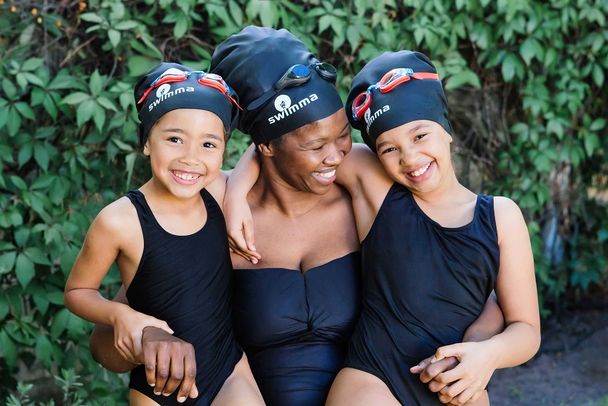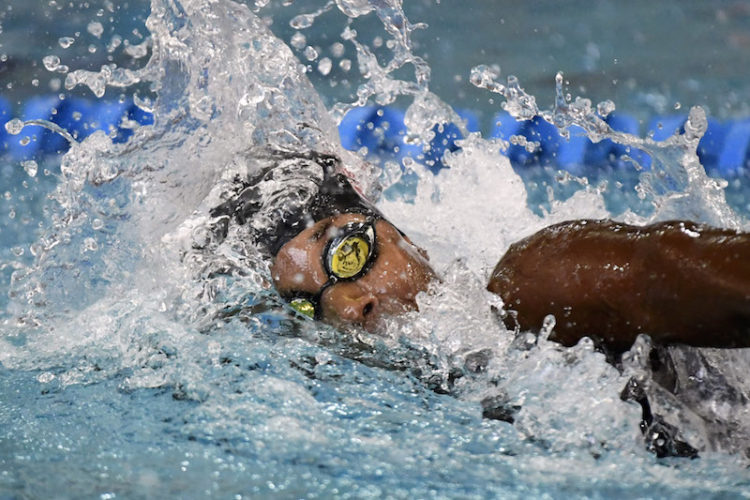Swimming classes were always a nightmare for me as a black girl. I would be consumed by dread whenever I saw it scheduled on the school timetable. And it’s not like I didn’t love swimming. But I hated the agony that came with carrying a burdensome schoolbag filled with a towel, costume and not one, but two swimming caps buried underneath my biology and mathematics textbooks. But that’s not where it ends.
Taking off my uniform and putting on the apparel was another surgical procedure. I always saved the worst for last when I would put on those rubbery swimming caps that tightly squeezed on my head and pulled the life out of my face.
And even with two swimming caps on, my hair would still get wet. I would sit in math class trying to figure out what x is with a throbbing headache while drops of chlorine water soaked my green uniform.
God forbid if I went to the salon the weekend before.
A new product on the market aims to alleviate this struggle that many black girls and boys face. Swimma Caps are made to accommodate high-volume hairstyles like dreads, braids, weaves and Afros. They are made with thick silicone material to prevent damage to natural hair and maintain updos that would be ruined by water.
It speaks to the larger and important issue of inclusion.
It was developed by Nomvuyo Treffers, a Capetonian photographer and mother of two who created the item after struggling to find caps that fit her hair. Her daughters, aged ten and eight, are ‘water babies’ and Treffers would watch them from the sidelines with a book in hand yearning to join them. But knew that if she did, she would have to either endure a long drying session or go to the salon to restyle. At one point, Treffers considered cutting her hair but would mean she would have to let go of her gorgeous locks.
She tried to find caps suited for her hair but they were only available overseas and they came with a hefty price tag. ‘I started thinking how can it be that in a country like South Africa, with the demographics that we have that we don’t have a product like this for black people,’ said Treffers.
Realising there was a gap in the market, Treffers turned a personal problem into profit when she ventured to start selling swimming caps specifically designed to suit African hairstyles. Developing the business was not easy. Finding the right manufacturer who understood her vision was an arduous task and it took her eight months to find a suitable producer.
Receiving positive feedback from clients all over the Africa has been a great reward for Treffers. She has had customers from all walks of life share their similar experiences. One black father lamented that he couldn’t spend quality time in the water with his children until he bought the caps. He called the product ‘a revolution’ and added how it has made him a better parent.
But this is bigger than swimming caps. It speaks to the larger and important issue of inclusion. As of late, there has been a strong global movement where people of colour have been demanding representation. And it’s not just limited to the realms of Hollywood with the #OscarSoWhite hashtag. It’s filtered through into everyday life with the emergence of merchandise made to match the needs of people of colour. We’ve seen it with products like dolls, clothes, lingerie, band aids and hair accessories.
https://www.instagram.com/p/BQ-9TdTF08X/?taken-by=swimma_caps
‘There is no such thing as one size fits all,’ says Treffers. ‘There is a dire need to feel represented.’
Treffers is now working with schools in Cape Town and Johannesburg to provide Swimma Caps to pupils. But this product has become more than a business for Treffers. Her daughters have watched her develop and build the brand from the ground up which sets an example for them. Swimma Caps has offered Treffers the opportunity to teach her young daughters to not to feel apologetic for having big curls or darker skin. They can discern how society views them and how they can be active in reshaping perceptions.
Big hair is not an obstacle to swimming because @swimma_caps has got us fully covered! Finally a swimming cap for our big hair and big head😁 pic.twitter.com/DEam2eNxGr
— Mrs FF (@fancyfunshy) April 22, 2017
‘I speak to them a lot because they do ask and I try to explain to them why things are a certain way,’ says Treffers. ‘I hope that they take the lesson that one does not have to accept things as they are, and should question the status quo and know that they can change the game.’
The caps are available for purchase at www.swimma.co.za and come in a variety of sizes and colours.


